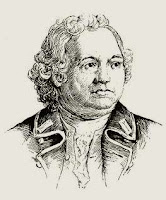 When I wrote yesterday’s essay about Gen. Joseph Spencer’s nickname, I asked myself, “And now will someone ask about ‘Old Put’?” And sure enough, on the Boston 1775 Facebook page Peter Fisk asked about “Old Put,” the fabled nickname for Gen. Israel Putnam.
When I wrote yesterday’s essay about Gen. Joseph Spencer’s nickname, I asked myself, “And now will someone ask about ‘Old Put’?” And sure enough, on the Boston 1775 Facebook page Peter Fisk asked about “Old Put,” the fabled nickname for Gen. Israel Putnam.And my answer to myself yesterday was, “Well, of course Putnam was called ‘Old Put’! He was old. His last name was Putnam. Every author in the world says he was called ‘Old Put’!” But I was fooled by every author saying Gen. Horatio Gates’s men fondly referred to him as “Granny,” which is where this week started off. So I decided I should calm down and do the research to answer Peter’s question.
There are several contemporaneous references to Putnam as “Old Put,” almost all of them coming from the very top of the Continental Army: Gen. George Washington’s headquarters.
- Mustermaster general Stephen Moylan to former military secretary Joseph Reed, 5 Dec 1775: “I would have given a good deal that you was here last Saturday when the stores arrived at camp. Such universal joy ran, through the whole as if each grasped victory in his hand, to crown the glorious scene there intervened one truly ludicrous, which was old PUT mounted on a large mortar which was fixed in its bed for the occasion, with a bottle of rum in his hand, standing parson to christen, while godfather [Thomas] Mifflin gave it the name of CONGRESS.”
- Moylan to Reed, 1 Feb 1776: “The Bay is open, everything thaws except Old Put. He is still as hard as ever, crying out for powder—powder—ye gods, give us powder!”
- Reed to Washington, 15 Mar 1776: “I suppose old Putt was to command the Detachment intended for Boston on the 5th Inst.—as I do not know any Officer but himself who could have been depended on for so hazardous a Service.”
- Washington back to Reed, 1 Apr 1776: “The 4000 Men destind for Boston on the 5th; if the Ministerialists had attempted our Works on Dorchester, or the Lines at Roxbury, were to have been headed by old Put.”
- Lt. Col. Joseph Ward, formerly aide to Gen. Artemas Ward, to John Adams, 9 May 1777: “Old Put—says, ‘Fact now is the time, I am for attacking the dogs without delay, drive them off that we me go home about our business’—thus he.”
Oddly, however, I didn’t stumble across any examples of enlisted men referring to their general as “Old Put.” The closest I found was veteran John Greenwood referring in his memoir to an operation ”planned by old Putnam.” More references might be buried in pension reminiscences or the like, but I was surprised, given how freely veterans spoke about his fellow Connecticut commander Spencer.
The Army and Navy Chronicle for 1837 yields one anecdote, credited to the New York Gazette, about that issue:
Original Revolutionary Anecdote.—That may be only a legend, but it certainly sounds true to Israel Putnam’s character.
When the American army was stationed in Putnam county [New York], during the Revolutionary war, one of the soldiers saw a boat approaching, and he cried out, there comes “old Put,” a name familiarly applied to the gallant General Putnam.
A young upstart officer hearing this caused him to be put under arrest for speaking disrespectfully of the General.
On the arrival of General Putnam on shore, he inquired what that man was sent away for?
The officer said, he has spoken disrespectfully of your Excellency.
What did he say? inquired the General.
He called you “old Put.”
So I am old Put, said he; release him instantly.
TOMORROW: Might as well do a full week—the general with the most exotic nickname.
Next, you may be finding out that George Washington wasn't addressed as "Your Excellency"! The sleuthing of nick-names has been deflating, yet fascinating.
ReplyDelete"Your Excellency" was standard eighteenth-century protocol for addressing a commanding general or a governor, so there's documentation of that phrase all over the place. If I ever come back to generals' nicknames, I have a different one for Washington in mind.
ReplyDeleteI think I recall Jefferson or someone like him calling Washington "Generalisimo", which in today's world sounds sarcastic, but then may have been a variation of an Old World title ... if it was true.
ReplyDeleteYes, the term “generalissimo” shows up a fair amount (in a variety of spellings). It’s just Latin for “top general,” “general of all the generals,” or commander-in-chief. I don’t think it appears often in the Congress’s official records, but there was no stigma about using it for Washington, especially in the first year.
ReplyDelete